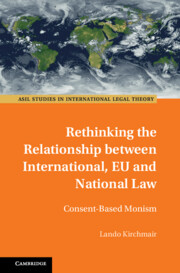Book contents
- Rethinking the Relationship between International, EU and National Law
- ASIL Studies in International Legal Theory
- Rethinking the Relationship between International, EU and National Law
- Copyright page
- Contents
- Figures and Tables
- Preface
- Acknowledgments
- Table of Cases
- Abbreviations
- Introduction
- Part I Common Theories on the Relationship of Legal Orders and Their Flaws Concerning the EU Legal Order
- 1 Dualism and Kelsenian Monism
- 2 Global Legal Pluralism and Constitutionalism
- 3 The “Autonomy” of the EU Legal Order as a Self-Standing Theory?
- 4 An Intermediate Conclusion
- Part II Consent-Based Monism
- Part III A Practical Application of Consent-Based Monism
- Conclusion
- Bibliography
- Index
3 - The “Autonomy” of the EU Legal Order as a Self-Standing Theory?
from Part I - Common Theories on the Relationship of Legal Orders and Their Flaws Concerning the EU Legal Order
Published online by Cambridge University Press: 29 February 2024
- Rethinking the Relationship between International, EU and National Law
- ASIL Studies in International Legal Theory
- Rethinking the Relationship between International, EU and National Law
- Copyright page
- Contents
- Figures and Tables
- Preface
- Acknowledgments
- Table of Cases
- Abbreviations
- Introduction
- Part I Common Theories on the Relationship of Legal Orders and Their Flaws Concerning the EU Legal Order
- 1 Dualism and Kelsenian Monism
- 2 Global Legal Pluralism and Constitutionalism
- 3 The “Autonomy” of the EU Legal Order as a Self-Standing Theory?
- 4 An Intermediate Conclusion
- Part II Consent-Based Monism
- Part III A Practical Application of Consent-Based Monism
- Conclusion
- Bibliography
- Index
Summary
This chapter holds that the CJEU follows two diametrically diverging doctrines regarding the relationship between international and EU, as well as EU and Member State law. From a theoretical perspective this is inconceivable. One and the same organization cannot follow two different approaches. However, from a pragmatic perspective, this chapter acknowledges that this Janus face of the CJEU is quite understandable. Autonomy understood as monism, on the one hand, is an expression of legal unity, which is absolutely necessary for the EU to safeguard its integration process. On the other hand, autonomy expressed as dualism helps to secure the stability of this integration process by separating the EU legal order from far-reaching international influences. However, at the same time, autonomy cannot provide for an adequate replacement of monism and dualism.
- Type
- Chapter
- Information
- Rethinking the Relationship between International, EU and National LawConsent-Based Monism, pp. 95 - 110Publisher: Cambridge University PressPrint publication year: 2024

